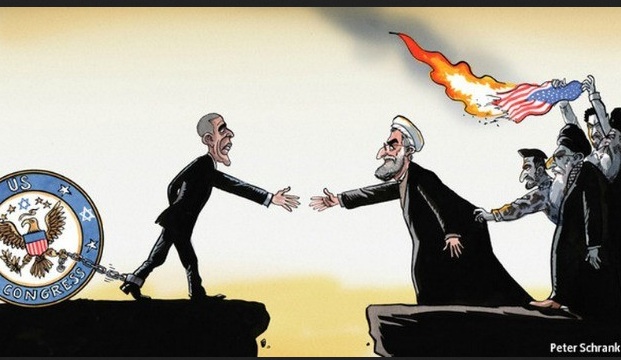Jonathan Masters and John B. Bellinger write: A vigorous debate is underway in Washington regarding what role Congress, and the United Nations Security Council, should play in reviewing and approving any deal between Iran and the so-called P5+1 major powers (the United States, Russia, China, France, the UK, and Germany). President Barack Obama’s administration says any Iran deal, which would likely involve easing extensive U.S. and international sanctions on Iran, would not be legally binding on the United States, and hence Congress should not have a role in approving it. Congress does not agree.
Congress has imposed a complex and overlapping array of sanctions on Iran, including through new sanctions enacted during the last five years, that target Iran’s oil and gas, petrochemical, shipping, and financial sectors. In addition, President Obama has imposed additional sanctions on Iran through a series of executive orders issued pursuant to the International Emergency Economic Powers Act.
Most of the congressional sanctions include waiver authority that permits the president to waive the different sanctions for a period of time if he determines that the waiver would be in the national interest or, Yet the president may modify the sanctions imposed by executive order at any time, either by suspending them or eliminating them.
The Iran talks are a multilateral negotiation, and U.S. negotiators must coordinate commitments they make to suspend or lift U.S. sanctions on Iran with the commitments made by the other so-called P5+1 countries. The UN Security Council has imposed sanctions on Iran in a series of six resolutions over the last nine years and the P5 countries, who are the five permanent members of the Council, have likely offered to support modification or lifting of these sanctions.
Germany, France, and the UK have likely promised to support modification of sanctions imposed by the European Union. That said, the current controversy between Congress and the Obama Administration is unusual in several respects.
First, it is certainly unusual for a large bloc of Congress (47 Republican Senators) to write directly to the leadership of another country (especially an adversary) in the midst of a sensitive negotiation being conducted by the president. Second, contrary to the apparent premise of the Republican letter, the Iran agreement would not be a treaty and does not require Senate approval. Moreover, according to the Obama Administration, it would not even be legally binding as a matter of international law (and therefore would not even have to be officially submitted to the Congress under the Case-Zablocki Act, which requires submission to Congress of legally binding international agreements that do not constitute treaties). In this respect, the Obama administration is correct that Congress traditionally has not had a role in reviewing and approving mere political declarations made by the executive branch (which are not legally binding under international law). Iran Deal, Sanctions and the US Congress

